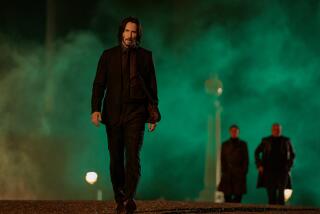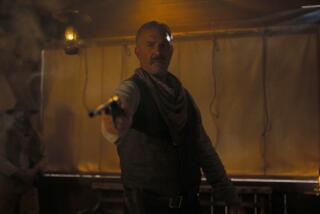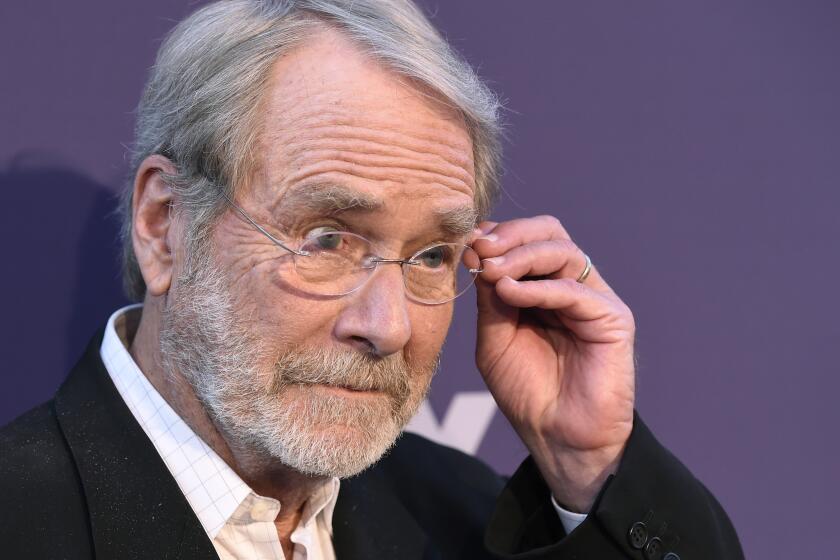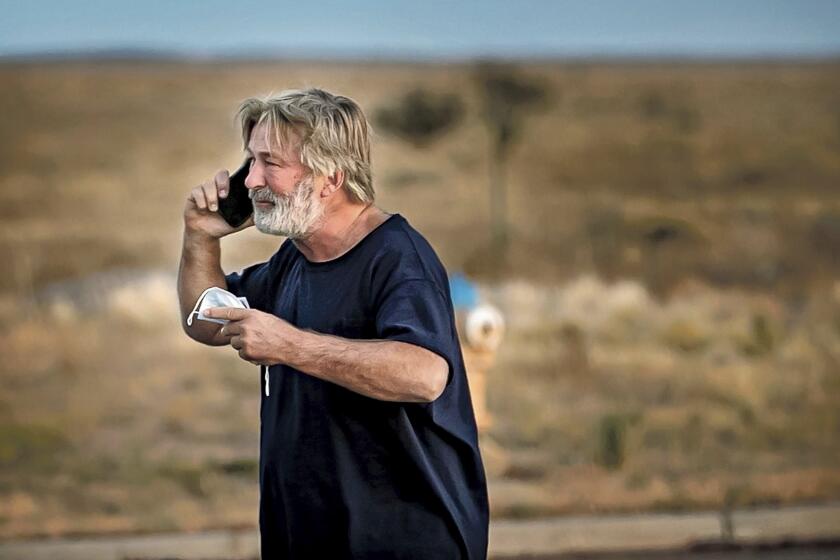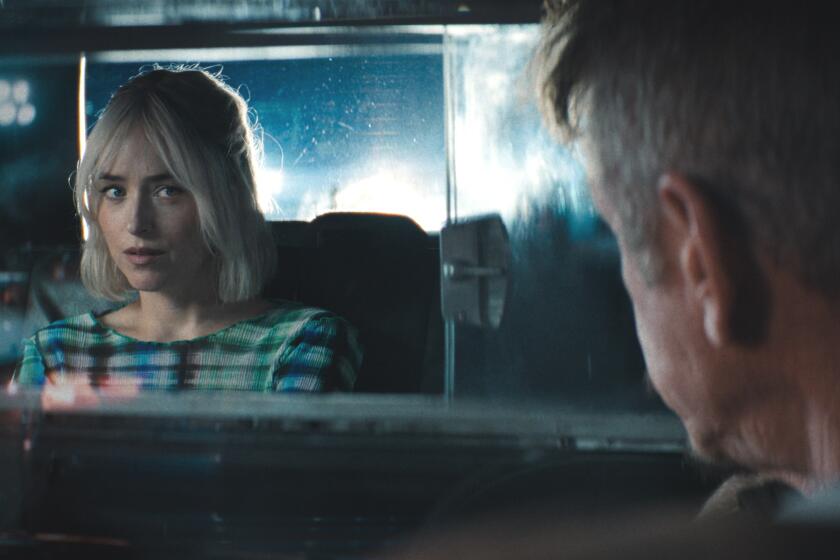Writer on film: That’s me up there!
“For the very nicest thing Hollywood can possibly think of to say to a writer is that he is too good to be only a writer.” -- Raymond Chandler
*
I saw “Adaptation” about three weeks before I turned in my most recent book. It was the middle of December, and I could feel the looming deadline as a constant pressure in my head. It had been a hard book, this book, an investigation into earthquakes, and like the character of Charlie Kaufman, I had struggled against my limitations -- the desire to make something beautiful out of science, the tendency to over-think, to over-research.
In fact, as the film unspooled before me, I was struck with an uneasy recognition, which slowly thickened into dread. That was me up there, I began to realize, all my false starts and procrastinations, my evasions, inadequacies, missed deadlines laid bare. When, halfway through the movie, Charlie’s agent called to tell him that it was time to finish up a script he’d barely started, I exploded in a fit of laughter, a laughter so prolonged and visceral that when it finally subsided, I felt as if I’d been purged.
What made “Adaptation” resonate so profoundly was that it was the first time I’d seen the working existence of a writer portrayed accurately in a studio film. Sure, I had encountered flashes elsewhere; I’d always been a sucker for Jack Nicholson’s performance in “The Shining” -- although that seemed to me more the story of what it was like to live with a writer than as one -- and, of course, there were “His Girl Friday” and “Sunset Boulevard,” two of the snappiest movies to come out of Hollywood’s Golden Age. Still, for all the charms of these motion pictures, they were less about writing, than a kind of back-lot archetype of the writing life.
Anyone who’s ever hung around a newsroom can tell you that the repartee between Cary Grant’s Walter and Rosalind Russell’s Hildy doesn’t happen at the average paper, just as the refusal of Joe Gillis’ agent to lend him $300 (“Don’t you know the finest things in the world have been written on an empty stomach? Once a talent like yours gets into that Mocambo-Romanoff rut, you’re through”) is basically just an industry in-joke, played for bitterly ironic effect.
Let Hollywood actually depict a writer writing, and the image was about as far removed from Charlie Kaufman as it could be. I’m thinking now of the scene in “The World According to Garp” in which Robin Williams, as Garp, sits down at the typewriter and effortlessly spins out his first short story, its perfect narrative flowing from his fingers with no hesitation, directly across the surface of the screen.
Of course, you can’t really blame George Roy Hill, who directed “The World According to Garp,” for not wanting to bog down his movie with endless scenes of writing; it’s hard to watch someone sit at a desk, typing, pausing, erasing, thinking, getting up to check the refrigerator, over and over, 20 or 30 times a day. Take that away, however, and what you’re left with is little more than a romantic image, an ideal of how a writer ought to be. In “Garp,” this means that the bulk of the story takes place not when the character’s working, but rather in his relationships with an array of oddly winning misfits, a cinematic milieu that is nothing if not larger than life.
Romantic sense of mission
The same is true in a different way of “Reds,” a film that focuses on a pair of historical figures: John Reed and Louise Bryant, members of the early 20th century Greenwich Village bohemian circle that included Eugene O’Neill. Reed and Bryant may not have been much as writers, but they did fall in love against the backdrop of the Russian Revolution, and this invests them with a poignant sense of mission, framing their work as secondary to their experience.
Even “Wonder Boys,” which opens as darkly as any writers’ movie ever -- its central figure, Grady Tripp, is a broken-down pothead, lost in academia, in love with a married woman and struggling with a 2,000-page book he cannot finish -- ultimately expresses its own romantic impulse, albeit on somewhat quieter terms. How can a character like Grady embody the romantic? It’s easier than it looks. Just clean him up, have him get the girl and write a publishable novel, then close the picture with a brand-new baby and a brand-new laptop, two unmistakable symbols of his brand-new life.
In many ways, films like “Reds” and “Wonder Boys” -- with their social purpose, their redemption -- represent a kind of aesthetic wish fulfillment, magical thinking on an epic scale. Hollywood, after all, has always treated writers poorly, which means they have no choice but to exalt themselves where they can.
During the 1940s, Jack Warner summed up the prevailing attitude when he said of William Faulkner, then under contract, “I have the best writer in the world -- for peanuts.” If a movie like “The Player” is any indication, such a sensibility has only grown more pointed; “I’ve yet to meet a writer who could turn water into wine,” declares Larry Levy, the executive played by Peter Gallagher. “There’s a lot of time and money to be saved if we came up with these stories on our own.”
“The Player,” of course, is emblematic of the other kind of story Hollywood likes to tell about writers: disaffected, even rancorous, tales of compromise and degradation a la “Sunset Boulevard.” In “The Big Picture” (1989), an eager AFI graduate is chewed up and spit out by the industry, only to find fulfillment in independent film. In “Barton Fink” (1991), meanwhile, a 1930s Broadway prodigy lands in California, where he becomes increasingly entangled in a web of alienation and despair. Although we do catch an occasional glimpse of him writing, such scenes pale in comparison with, say, John Mahoney’s portrayal of a charming, Faulkner-esque drunkard (the only response, perhaps, to Warner’s peanuts: to drink oneself into oblivion on the company tab?), or the bloodbath toward the movie’s end.
None of this, though, matches “The Player” for sheer cynical amusement; here, the producer actually kills the writer -- and gets away with it. If you look between the lines, you can see a peculiar kind of morality play, in which the more depraved the circumstances, the more the nobility of the writer is affirmed.
What’s fascinating about a film like “Adaptation” is that it seems entirely uninterested in the nobility of the writer; the writer is the most depraved person in the mix. Even more, his depravity is the result of his writing, his inability to wrestle the raw material of his screenplay into a sequence of coherent scenes.
This is important for a couple of reasons, not least because it suggests a strategy, finally, for making movies that deal with writing not as romance or metaphor, but rather as a job. Yes, writers do a lot of things, but first and foremost, they write. That’s a fact pictures like “The World According to Garp” or “Reds” tend to gloss over, and even “Wonder Boys” and “Barton Fink” only touch on it peripherally, when the characters discuss their struggles, struggles we never truly witness.
In “Adaptation,” however, the struggle is the substance, a notion that also emerges in at least one other recent film, “The Hours.” My favorite moment in that movie occurs when Virginia Woolf takes a walk and begins to talk to herself, reworking a scene she’s in the midst of writing, one she can’t quite figure out. In much the same way as “Adaptation,” Woolf’s self-absorption struck an uneasy chord in me, as if I were seeing myself exposed. This, after all, is what I do, also: haunt my neighborhood streets, puzzling out unresolved ideas and situations, thinking, pondering, stopping to take notes ... even, at times, talking to myself out loud.
The issue, of course, is what all this newfound realism means, if anything. Is the industry’s sense of writers maturing? Is it a trend or a coincidence? I don’t know the answers to those questions, but this year, anyway, the studios seem to have gotten it right. I still find it hard, I must admit, to imagine movies about writing really playing, since even among writers, there’s only so much looking in the mirror you can take. Yet if a film like “Adaptation” -- with its hangdog writer protagonist, shoulders hunched, clothing rumpled, face twisted in a mask of perpetual worry -- has a message, it may be that it is finally good enough “to be only a writer,” even in Hollywood.
More to Read
Only good movies
Get the Indie Focus newsletter, Mark Olsen's weekly guide to the world of cinema.
You may occasionally receive promotional content from the Los Angeles Times.
